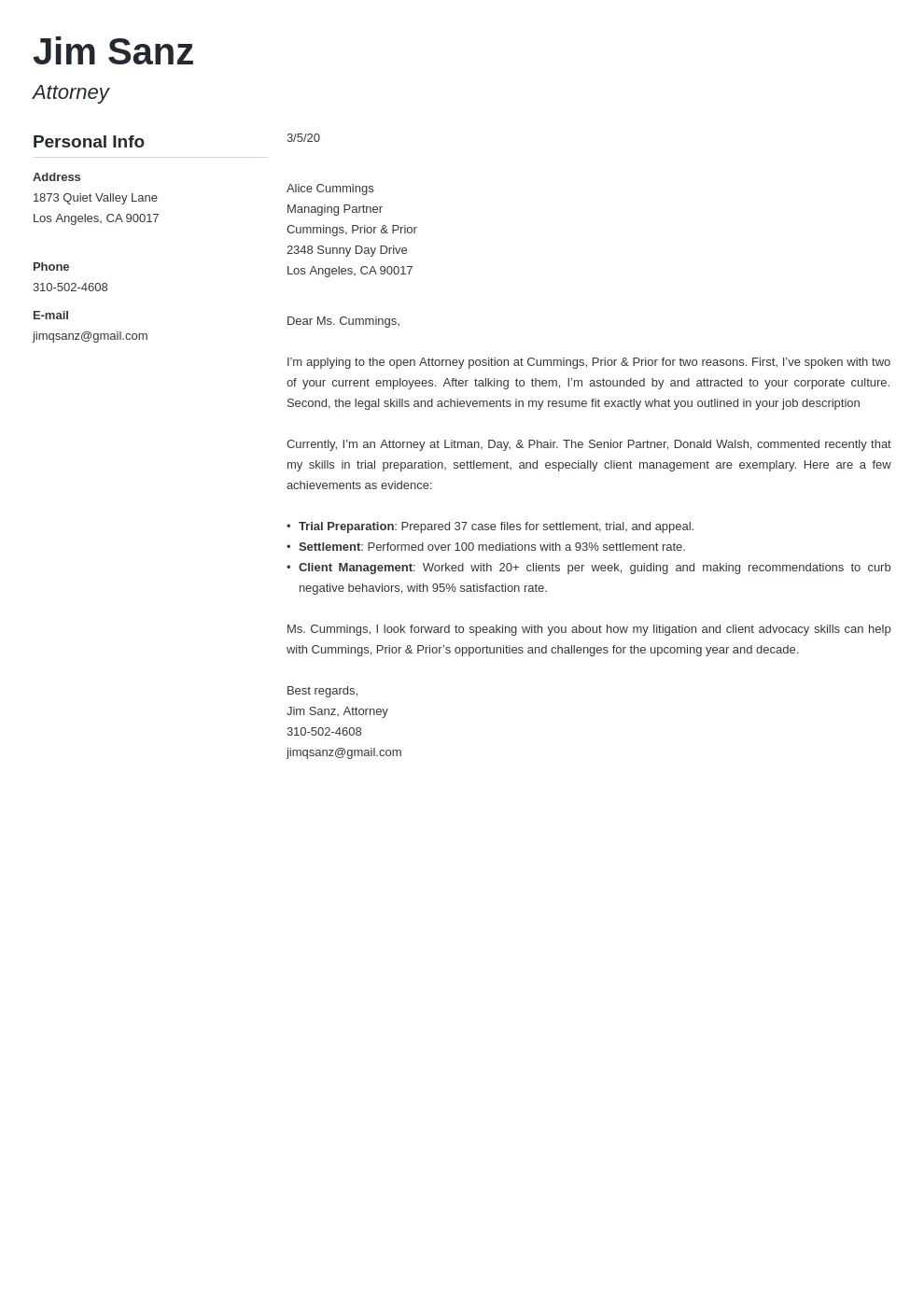What is a Lawyer Cover Letter?
A lawyer cover letter is a crucial document that accompanies your resume when applying for legal positions. It serves as your first impression, allowing you to introduce yourself, showcase your skills and experiences, and express your interest in a specific role or firm. Unlike a resume, which provides a factual overview of your background, a cover letter provides an opportunity to demonstrate your personality, writing skills, and understanding of the legal field. A well-crafted cover letter can significantly increase your chances of getting noticed by potential employers and securing an interview. It is your chance to make a compelling case for why you are the ideal candidate and should be considered for the position.
Importance of a Strong Cover Letter
In the competitive legal profession, a strong cover letter is not just recommended it is essential. It sets you apart from other applicants and highlights your unique qualifications. Many hiring managers use cover letters to quickly assess a candidate’s communication skills, attention to detail, and genuine interest in the position and the firm. A well-written letter demonstrates your ability to think critically, articulate your thoughts, and connect your skills to the employer’s needs. It gives you the opportunity to explain gaps in your resume, address specific job requirements, and express enthusiasm. Neglecting to include a cover letter, or submitting a poorly written one, can send a negative signal, potentially leading your application to be overlooked.
Essential Components of a Lawyer Cover Letter
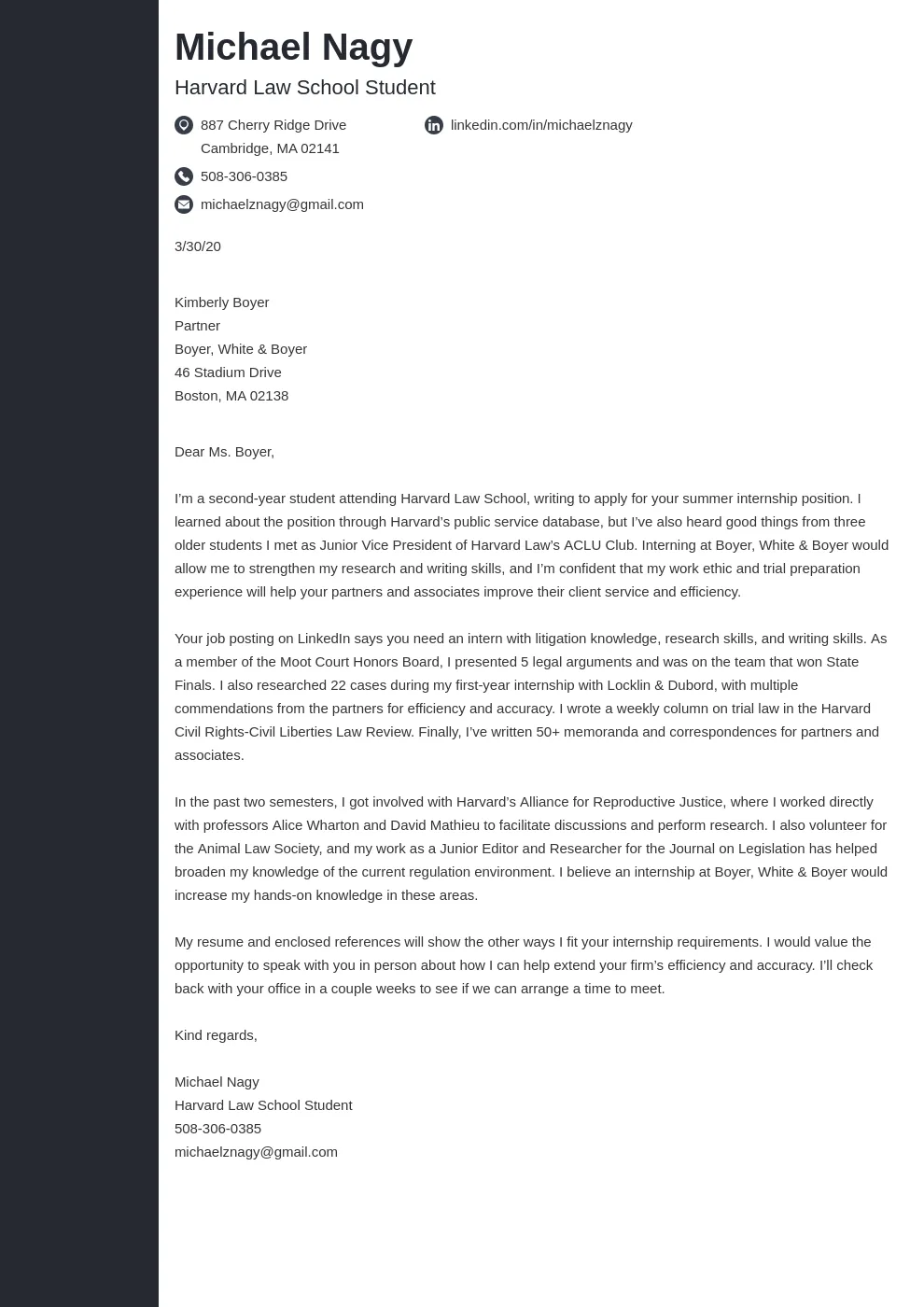
A compelling lawyer cover letter must include several key components to effectively convey your qualifications and enthusiasm. The structure should be professional and easy to follow, with each section serving a specific purpose. This includes clear contact information, a personalized opening, a section highlighting your relevant skills and experience, a demonstration of your passion for law, a strong closing statement, and a careful proofread. Each element contributes to the overall effectiveness of your application, and neglecting any of these can weaken your candidacy. The goal is to create a document that is both informative and persuasive, leaving a lasting positive impression on the reader.
Contact Information
Begin your cover letter with your contact information, including your full name, address, phone number, and professional email address. This should be located at the top of the letter, either left-aligned or centered. Make sure the information is accurate and up-to-date so the employer can easily contact you. It’s also important to include the date and the recipient’s information (name, title, law firm name, and address), if known. If you are sending an email cover letter, include your contact information at the end of the email, as well, for easy reference.
Opening Section Crafting
The opening of your cover letter is critical as it sets the tone and grabs the reader’s attention. Start by addressing the hiring manager or the appropriate contact person by name. If you do not know the name, research the firm’s website or LinkedIn to find it. Avoid generic greetings like “To Whom It May Concern.” State the position you are applying for and briefly explain how you learned about the opportunity. In your opening, express your enthusiasm for the role and the law firm. Consider including a brief, impactful statement about why you are a good fit, referencing your key skills or experience, to make your statement more persuasive.
Highlighting Your Skills and Experience
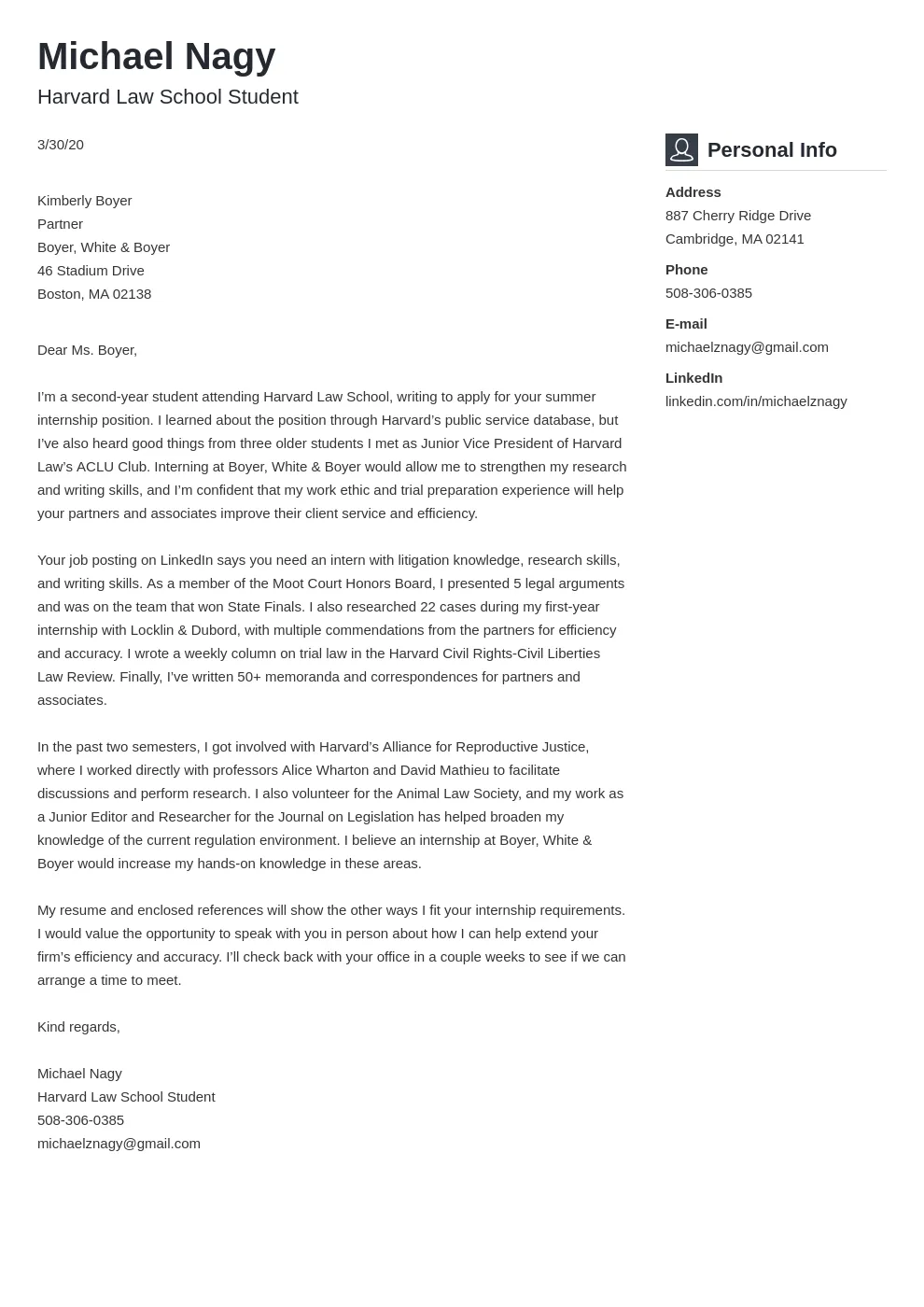
This is the core of your cover letter, where you showcase your qualifications. Review the job description and identify the key skills and experiences the employer is seeking. Then, provide specific examples from your education, internships, or past jobs to demonstrate that you possess these qualities. Use the STAR method (Situation, Task, Action, Result) to describe your experiences in a clear and concise manner. Quantify your accomplishments whenever possible. For example, instead of saying “Successfully managed cases,” say “Managed a caseload of 50+ cases, resulting in a 90% success rate.” This allows you to show, don’t just tell, and prove that you are capable of succeeding in the position.
Tailoring to the Specific Job
Each cover letter should be customized for the specific job and law firm. Generic cover letters that are not tailored to the specific role are easily recognizable and often disregarded. Show that you have researched the firm, understand its values, and recognize what the firm is looking for in an employee. Address specific requirements mentioned in the job description and explain how your skills align with those requirements. Demonstrate your understanding of the legal area the firm practices in and your interest in the firm’s work. This level of personalization shows that you’re genuinely interested and have put in the effort to research the position.
Demonstrating Your Passion for Law
Law firms want to hire people who are passionate about the law and dedicated to their careers. Use your cover letter to express your genuine interest in the legal field and the specific area of law the firm practices. Explain what excites you about the firm’s work or the challenges you want to tackle. Mention any specific cases or legal issues that have caught your interest, if relevant. Show that you have a long-term commitment to your legal career. Demonstrating passion makes a strong impression and signals that you will be motivated and committed to the role.
Closing the Letter
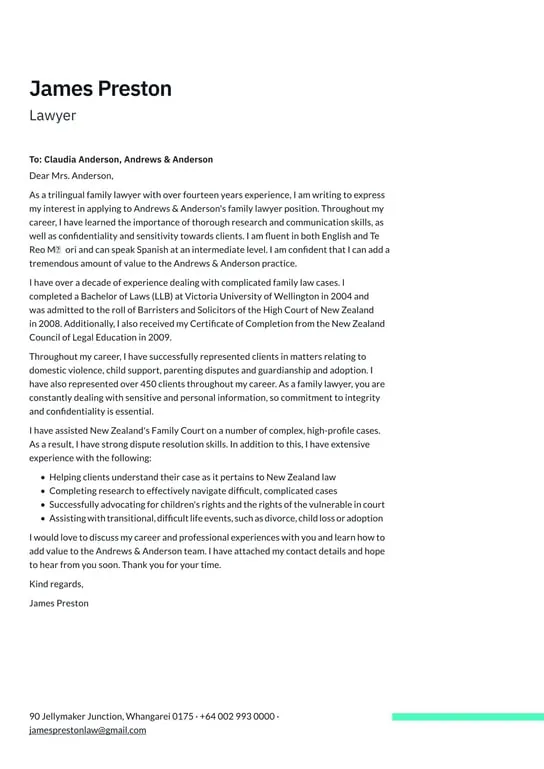
In your closing, reiterate your interest in the position and thank the hiring manager for their time and consideration. Express your eagerness to discuss your qualifications further in an interview. Provide a clear call to action, such as “I look forward to hearing from you soon” or “I am available for an interview at your earliest convenience.” Make sure your closing is professional and polite. Include your contact information again to make it easy for the reader to reach you. A strong closing leaves a lasting positive impression.
Proofreading and Formatting
Before submitting your cover letter, carefully proofread it for any errors in grammar, spelling, and punctuation. A single mistake can damage your credibility and signal a lack of attention to detail. Consider asking a friend, professor, or career counselor to review your letter for you. Ensure your cover letter is formatted professionally, using a clean font like Times New Roman or Arial, and appropriate margins and spacing. The layout should be easy to read. Use paragraphs to break up large blocks of text and make it easier for the reader to scan. A well-formatted and error-free cover letter shows that you value professionalism and attention to detail.
Lawyer Cover Letter Examples
Reviewing cover letter examples is a great way to understand the various approaches and styles. Look at templates and examples that align with your specific field, like corporate law or criminal defense. Tailor your letter to fit the specific requirements of the firm, and note how other successful applicants have formatted their letters. Remember, your cover letter is a representation of you, so ensure the tone and language are appropriate.
Example 1 Specific Area
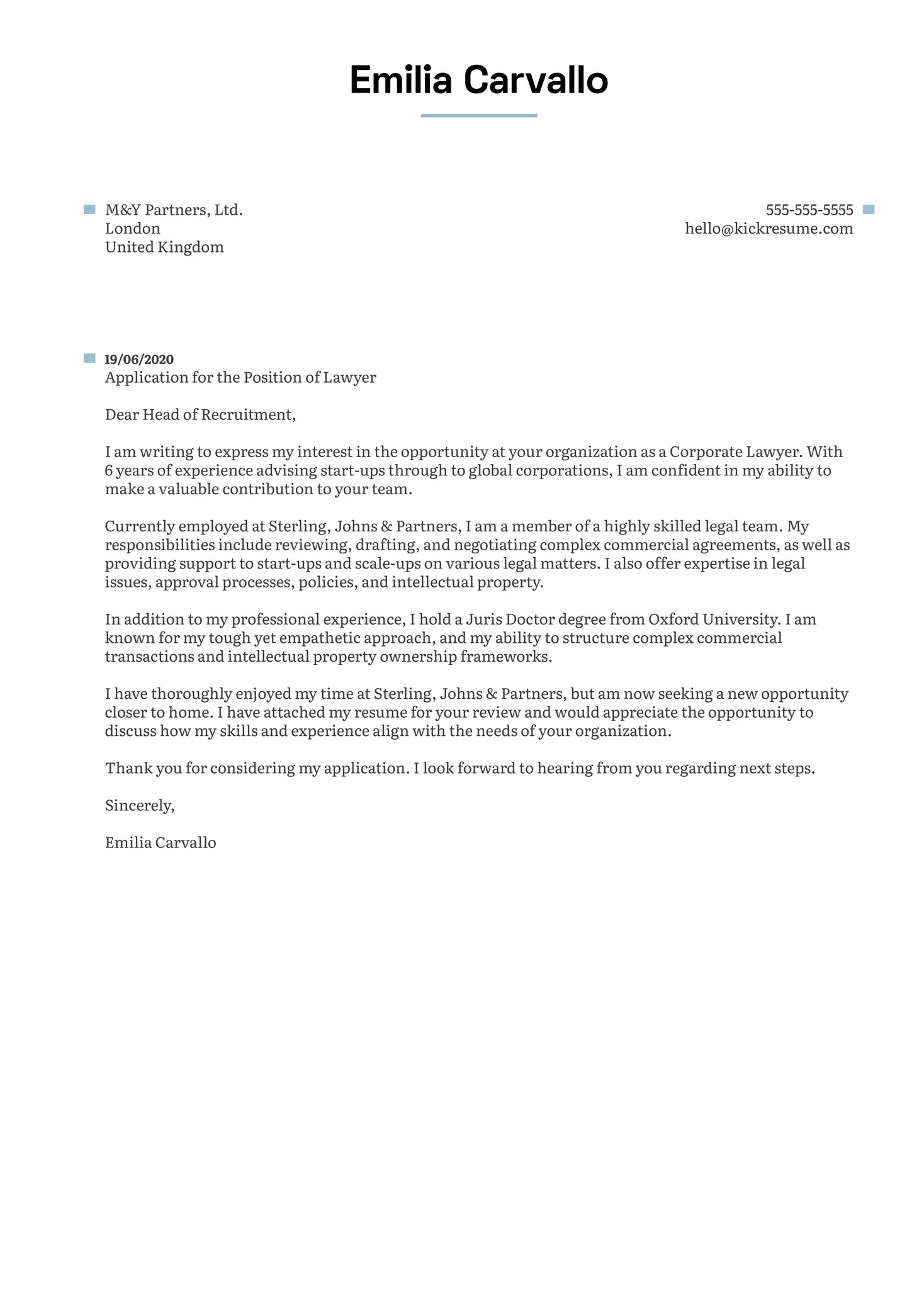
Here is a hypothetical example: “Dear [Hiring Manager Name], I am writing to express my keen interest in the Associate Attorney position at [Law Firm Name], as advertised on [Platform]. With a strong foundation in [specific area of law] and experience in [relevant experiences], I am well-equipped to contribute to your team’s success. My previous role at [previous firm] provided me with hands-on experience in [specific tasks]. I am excited about the prospect of applying my skills at [Law Firm Name]. I am excited to have the opportunity to contribute to [Law Firm Name]’s legacy of success.”
Example 2 Skills-Based
Another example demonstrates skills based approach: “Dear [Hiring Manager Name], I am eager to apply for the Junior Associate position at [Law Firm Name], as seen on [Platform]. My expertise in [specific skills] and my proven track record in [achievements] make me a strong candidate. During my internship at [Organization], I developed proficiency in [tasks], achieving [quantifiable results]. The culture at [Law Firm Name] has always resonated with me. I hope to enhance the firm’s goals and maintain its standards.” Remember to tailor the skills and achievements mentioned to meet the job’s requirements.
Common Mistakes to Avoid
Avoid generic or impersonal cover letters. Generic letters fail to make a good impression. Also, do not include irrelevant information or overly long paragraphs. Keep your letter concise and relevant. Typos and grammatical errors are a common pitfall. Always proofread carefully, and have someone else review it. Do not be negative or make excuses, and avoid exaggerating your qualifications. The goal is to represent yourself truthfully and professionally. Finally, failing to follow instructions or neglecting to tailor the letter to the specific job are critical mistakes that should be avoided at all costs.
